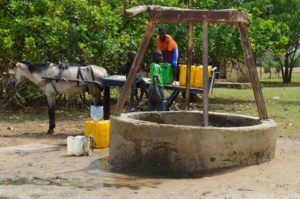Clean Water and Sanitation in Fimela, Senegal
State : Completed | Number of beneficiaries : 4405 students, 2 health posts, 1000 parents and children, 15000 villagers
Project duration : 24 months
Location : Municipality of Fimela, Fatick region, Senegal
Local partner
Jeunesse et Développement (JED) / Eclaireurs et Eclaireuses du Sénégal (EEDS) is a development NGO created in 1936, and established in all regions of Senegal, inspired by Scout values, at the service of young people and the community. Its mission is to contribute to improving the quality of life of populations, mainly in the fields of health, education, socio-economic integration and the environment, in particular by preparing young people for their role as active and responsible citizens.

Context
In Senegal, the Fimela area was recently the subject of a study, led by our local partner JED, one of the objectives of which was to map the needs of the populations in the face of climate change. It was carried out within the framework of the “Community Program for Mitigation and Adaptation in the Face of Climate Change in the Fimela Zone” (PCA.2C) currently being carried out by JED with the support of PADEM.
During this study, the populations met mainly raised issues relating to water and sanitation as well as the environment such as:
- the lack of access to drinking water and the lack of sanitation infrastructure in schools, daaras, and health posts. The lack of water affects the quality of the school or health services offered.
- pollution of the environment by the invasion of plastic bags and the anarchic proliferation of garbage in all localities.
The mission
General objective: The system of access to water and sanitation is improved in the region of Fatick.
Specific objective: Schools, daaras and health posts in the municipality of Fimela have access to drinking water and toilets.
Activities
- Construction or restoration of 54 separate girls / boys sanitary blocks in 10 schools and 5 daaras as well as in 2 health posts
- Installation of 6 water tanks in these same schools, daaras and health posts
- Sensitization of children and the population to personal and environmental hygiene
- Implementation of environmental education activities in schools (installation of bins, community compost, nurseries …)
Beneficiaries
- 4405 students will benefit from access to water and sanitation facilities
- 2 health posts will benefit from the same type of facilities
- 1000 parents and children will be sensitized on issues relating to hygiene and the environment
- 15000 beneficiaries will be impacted through radio broadcasts and talks on these same topics
